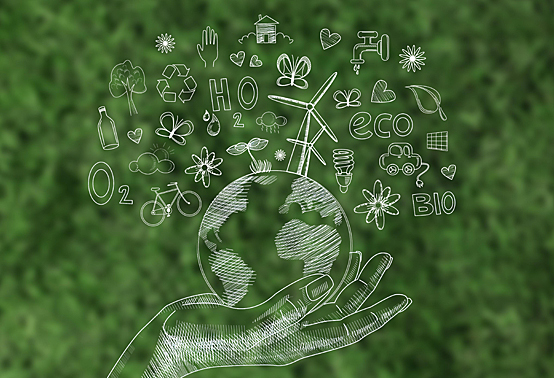Press release 2021-12-08 at 11:34

© Freepik
The Finnish Environmental Institute SYKE has collected a sample of environmental claims in internet advertisements during autumn 2021. The share of internet in advertising has continuously grown and was about half of all advertisement in Finland in 2020. A comprehensive data of environmental advertisement has been lacking before the study.
The sample was supplemented by a citizen science campaign between 15th and 19th November. During the campaign about 80 observations were collected via social media and an anonymous web form. The campaign also raised interest and discussion in social media.
Carbon neutral, sustainable and ecological - commonly observed claims
The most common themes observed were carbon neutrality, sustainability, ecologicality and seller’s own labels and graphics. Often these general claims of environmental superiority were justified by just one action, or in some cases, none at all.
The carbon neutrality of a product, service or company was almost always reached by compensating a carbon footprint, but not specifying the amount of carbon emissions that were compensated. Often the claimed carbon neutrality was to take place some year in the future.
Especially the carbon neutrality of carbon-intensive products raised lively comments by the citizens: “A tree begins to sequester carbon only after many years and how one can tell their situation right now? Are they there anymore? How’s the claim proofed now and in the future?“ asked one of the respondents. “Is there a risk that an ad sells clear conscience – probably falsely grounded – and so gives a blessing to continue or even increases harmful and carbon-intensive consumption?” wondered another respondent.
A third one reported that “In my opinion the compensation projects and calculations are duly presented, there the company X is doing proper work. Despite this I’m sick and tired that the product Y is stamped as a nice, green and sustainable. I think the principle should be that compensate only when there is no way to cut emissions.”
Shades of green: symbols, biological origins, biodegradability and naturality
Many label look-a-like graphics, such as earths, leaves and recycling triangles were observed. They were not recognized environmental labels as are for instance the Nordic Swan, EU ecolabel or the EU organic logo.
It is to be noted, that the four above mentioned themes correspond to about half of all observations. A variety of claims were collected, for example: recyclability, micro plastics, natural ingredients, biodegradability, and unnecessary extras. Citizens also noted quite some fossil fuel advertising and not disclosing harmful effects while claiming just some minor improvements.
The project continues by classifying the advertisements and claims
Next the research project will classify the collected advertisements. Analyzing these classifications will give a view of the prevailing situation: what kind of claims are being made, by what industries, to what environmental impacts, and regarding specific products or whole companies, for example.
“It is not a simple task to collect a sample of ads. In Finland, we do not have them ready in a comprehensive library. We contacted publishers and enquired possibilities to collect ads they have published, but they were not given to us due to legal reasons. So, we invented our own means to monitor and collect claims in the web. In the future, advertisements could be collected from different places by automated and participatory methods”, says researcher Tero Heinonen from the Finnish Environmental Institute.
Help and know-how to manufacturers, importers and advertisers
The project will also arrange workshops for advertisers. The aim of the workshops is to find out the challenges encountered when making environmental claims and provide help and guidance to these challenges.
“Advertising could have a strong role to play in the sustainability transition ahead of us. Major part of product information is received via the sales channel. Consumers are interested in environmental impacts of different products and these should be communicated in a trustworthy manner. Also, the companies producing better options for the environment should be marketed without the fear of unfair competition”, concludes Heinonen.
Read more
More information
-
Researcher Tero Heinonen, Finnish Environment Institute, tel. 029 525 2123, forename.surename@syke.fi
-
Communications Specialist Katja Lepistö, Finnish Environment Institute, tel. 0295 252 082, forename.surename@syke.fi